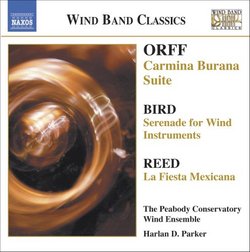| All Artists: Carl Orff, Arthur Bird, Herbert Owen Reed, Peabody Conservatory Wind Ensemble Title: Orff: Carmina Burana Suite; Bird: Serenade for Wind Instruments; Reed: La Fiesta Mexicana Members Wishing: 0 Total Copies: 0 Label: Naxos Original Release Date: 1/1/2006 Re-Release Date: 8/29/2006 Genres: Jazz, Classical Styles: Swing Jazz, Opera & Classical Vocal, Chamber Music, Historical Periods, Classical (c.1770-1830), Modern, 20th, & 21st Century Number of Discs: 1 SwapaCD Credits: 1 UPC: 747313024278 |
Search - Carl Orff, Arthur Bird, Herbert Owen Reed :: Orff: Carmina Burana Suite; Bird: Serenade for Wind Instruments; Reed: La Fiesta Mexicana
 | Carl Orff, Arthur Bird, Herbert Owen Reed Orff: Carmina Burana Suite; Bird: Serenade for Wind Instruments; Reed: La Fiesta Mexicana Genres: Jazz, Classical
|
Larger Image |
CD Details |
CD ReviewsThree Four-Letter Composers J Scott Morrison | Middlebury VT, USA | 09/16/2006 (5 out of 5 stars) "No, I don't mean they used four-letter words. I'm just remarking on the strange fact that each of these composers has a four-letter last name -- Orff, Bird, Reed -- a nice kind of symmetry. Probably for most buyers the big attraction here will be the suite taken from Carl Orff's 'Carmina Burana' but for me it was the least attractive thing on the CD. Although it is expertly done and expertly played, as well as expertly recorded, I cannot, I'm sorry to admit, hear this music without supplying in my mind's ear the vocal parts of the score, missing in this all-instrumental version. After all the original requires vocal soloists and three choirs. That (rather large for me) quibble aside, this is a good performance of the suite as arranged by John Krance. The arrangement shortens the original partly by eliminating lots of Orff's repeats, appropriate in a non-vocal version. The big discovery here, though, is the delectable Wind Serenade, Op. 40 of the all-but-forgotten Arthur Bird. He was born in Belmont, Massachusetts in 1856, had his initial instruction in music from his father and uncle who were hymn composers and arrangers. He was sent in his teens to Berlin where he studied for several years, eventually becoming a friend and acolyte of Franz Liszt. He returned briefly to North American (Halifax, Nova Scotia) and then moved back to Berlin permanently where he married a rich widow, living in a palace and maintaining a sumptuous downtown Berlin apartment. He wrote an opera, 'Daphne', and is reputed to be the first American to write music for a major ballet, 'Rübezahl.' He wrote an early wind octet for the famous French flute virtuoso, Paul Taffanel, but that is not the work heard here. The notes for this release are virtually non-existent and they get the instrumentation wrong. My ears tell me that this work is for ten winds -- two each of flutes, oboes, clarinets, bassoons and horns. The work is in four movements and lasts a little more than twenty-four minutes. It is exceedingly tuneful, has a skillful contrapuntal texture for much of its length, is harmonically very much of the late 19th-century, reminding me at times of chamber works for wind by Richard Strauss or Ludwig Thuille. In my opinion, this work is worthy of frequent presentation. It is a truly superior work of its kind. And the Peabody wind players do a heckuva job here. I've now listened to the work four times and keep discovering new delights. Much better known, at least in the band world, is the music of the now-96-year-old H. Owen Reed, the long-time professor of composition at Michigan State University and a doyen of wind band music in America. 'La Fiesta Mexicana' is a wind symphony based on Mexican folksongs and from its premiere in the mid-1950s by the US Marine Band, for whom it was written, it has been played literally hundreds of times by wind ensembles all over the world. It has also served as music for a ballet. It is notable for its rhythmic complexity (especially in the third movement), creative use of brass and percussion, and a hieratic complexion unexpectedly compatible with echoes of mariachi music. I counted six other recordings of the work available here at Amazon.com. I know those conducted by renowned band conductors Frederick Fennell and Eugene Corporon and the present recording deserves to stand in their company. This is a sizzling account of the lovable work. I am giving this recording five stars even though I was less than sold by the wind ensemble arrangement of 'Carmina Burana.' That's because I suspect that others will love it and am willing to concede that my response may be idiosyncratic. Scott Morrison" Carmina, the winds expound! C. Bryan | Long Beach, CA | 01/12/2007 (4 out of 5 stars) "Hey, you love CB as much as I do? For winds, this is special; and this orch. does a great job - without repetition (essential in vocal form) or some of the passages that cannot transcend the medium. Wonderful!!! A pleasure to hear and short enough for those who know every note by heart. Naxos never borke your wallet either; a bargain, my friend. Really four and 7/10 stars!"
|

 Track Listings (20) - Disc #1
Track Listings (20) - Disc #1